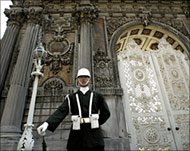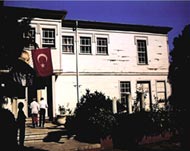Dervishes face modern dilemma
Famed for their devotion and spirituality, Turkey’s whirling dervishes have become something of a local trademark in recent years. But the blaze of publicity has been causing deep debate and division within the dervish community.

Appearing in tourism promotion films and at Eurovision song contests, their distinctive circular dancing has never been more widely publicised.
Some say what has been happening of late is a sign of a new, more broad-based spirituality. But others see it as a commercialised sellout of fundamental principles.
The controversy began when a group of dervishes in Istanbul began holding the sema – the traditional whirling dance – with mixed groups of men and women.
They also began wearing brightly coloured costumes, or tenures, and announced themselves open to all – regardless of religion.
“They have every sort of thing available to them,” says Abdulhamit Cakmut of the Mevlana Education and Culture Association.
“They are saying they can drink alcohol, play clarinet … their leader has an obsession with women. In future, there could be scandals.”
For their part, the group, known as the Contemporary Lovers of Mevlana Foundation (EMAV), denies any impropriety.
Regular feature
What is beyond dispute is that the group performed two years ago on stage in support of Turkish singer Sertab Erener’s Eurovision Song Contest entry.
Dervishes have also become a regular feature of dance performances, such as those of DJ Mercan Dede, who has become very successful both in Turkey and the US with his blend of trance, dance and dervish music.
|
“In 730 years of Mevlana, never have men and women performed the Abdulhamit Cakmut, |
The teachings and sayings of Mevlana Celaleddin Rumi are taken as fundamental for many Turkish dervishes, the 13th century Sufi mystic having lived the last years of his life in Konya, in central Turkey.
To him and his disciples, all religions are more or less truth. His breathtaking poetry and advocacy of unlimited tolerance, positive reasoning, goodness, charity and awareness through love have made him especially popular with “new age” Western spiritualists.
Not surprisingly, the actions of the EMAV have deeply offended Turkey’s dervish establishment.
Opposites?
“In 730 years of Mevlana, never have men and women performed the sema together,” Cakmut said, adding that the EMAV group are “completely the opposite of us”.
 |
|
Dervish sects were very powerful |
“The Sertab song abused Mevlana to sell records,” he said. “They translate dervish song into Turkish, add guitars and other instruments, but in Mevlevi culture, the instruments are fixed. Their costume is colourful too, but you can’t do that. This is cheating people.”
Traditionalists argue that the costume must be of undyed wool, with a black cape and a distinctive brown conical hat, used to symbolise the tombstone. The costume is highly symbolic – as is every part of the dervish ritual.
The EMAV dervishes counter that they are promoting the message of Mevlana far more effectively and truthfully than traditionalists.
“The symbolic meaning of the sema is a rose garden,” says Gul Ayhan, a woman who has performed the sema with EMAV for several years. “There are various types of roses, so why not a colourful tenure?”
As for the Eurovision incident, “originally, we were to perform separately”, Tolga Gogus, another dervish from EMAV, said.
“Then, on the night, the organisers put us together. But on the other hand, Sertab’s song is about love, and for us this means spiritual love, so we thought it was OK to accompany her. There was nothing disrespectful going on.”
Once powerful
Dervishes have long had a controversial role in Turkey. In Ottoman times, many lodges, or tekke, were founded and flourished throughout the lands that now make up the modern country.
Different dervish sects were also very powerful politically within the imperial structure. However, in 1924, following the collapse of the Ottoman Empire and the birth of the secular Turkish Republic, tekke were banned and many of their leaders persecuted.
“We don’t want any friction with the others. Our way is unity and bringing together. But if they feel that way about us, what can we say?” Gul Ayhan, a woman who has performed the sema with EMAV |
The ban is still technically valid today, and unofficial lodges must register as “music societies” or “folk groups”.
“We don’t have any connection with tekkes,” Cakmut said emphatically. “Mevlevism is a spiritual movement and has nothing to do with tekkes. There is nothing more going on. Our job is education and music.”
Ongoing conflict
The most well-known dervish venue today in Istanbul is the old Celebi tekke in Beyoglu, on the city’s European shore. The Celebis are the direct descendants of Mevlana. There, EMAV performs a sema once a fortnight to a packed audience, with many foreigners also present.
 |
|
The old Celebi tekke in Istanbul |
The group alternates with the Mevlana Educational and Cultural Association, who are also a popular sight for tourists and believers.
The building is owned by the Turkish Culture Ministry, which runs it as a museum, and the weekly sema is officially only an example of local “folk dancing”. This too causes some unease.
“If you put this on in a hotel lobby or as entertainment at a wedding, it would ruin it,” says Cakmut. Where this leaves a “music and education” show for tourists is not clear, although the ritual itself is performed with absolute sincerity and belief.
Meanwhile, the conflict between “new age” and traditionalist dervishes continues.
“We don’t want any friction with the others,” says Ayhan. “Our way is unity and bringing together. But if they feel that way about us, what can we say?”